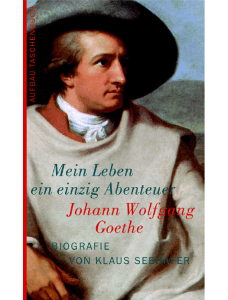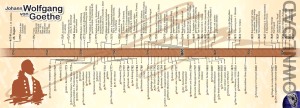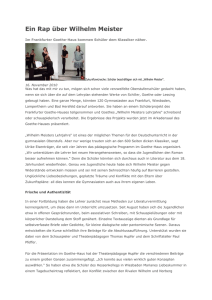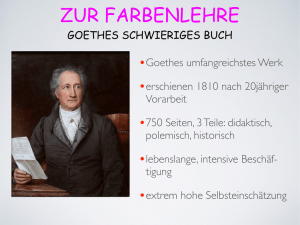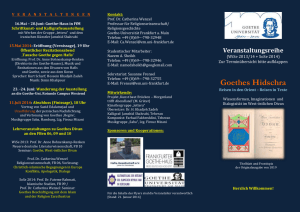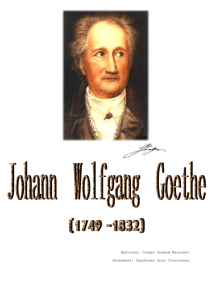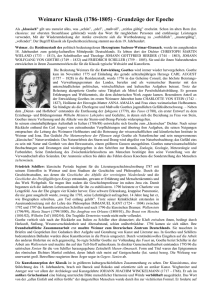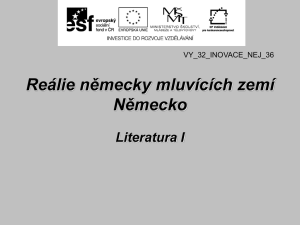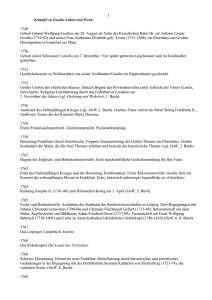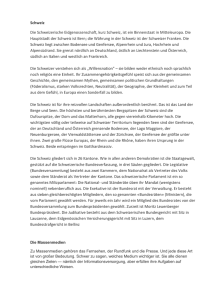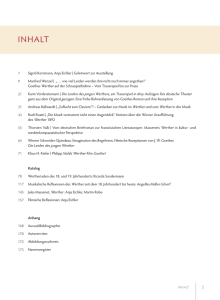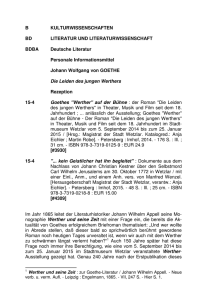Goethe`s narrative fiction
Werbung
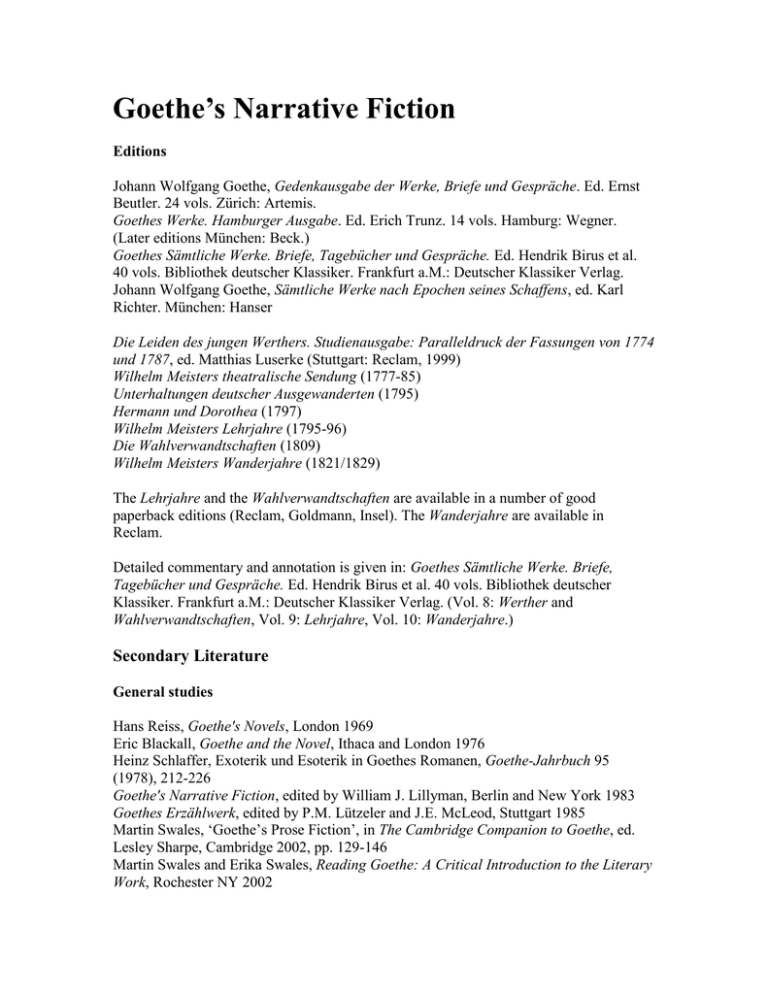
Goethe’s Narrative Fiction Editions Johann Wolfgang Goethe, Gedenkausgabe der Werke, Briefe und Gespräche. Ed. Ernst Beutler. 24 vols. Zürich: Artemis. Goethes Werke. Hamburger Ausgabe. Ed. Erich Trunz. 14 vols. Hamburg: Wegner. (Later editions München: Beck.) Goethes Sämtliche Werke. Briefe, Tagebücher und Gespräche. Ed. Hendrik Birus et al. 40 vols. Bibliothek deutscher Klassiker. Frankfurt a.M.: Deutscher Klassiker Verlag. Johann Wolfgang Goethe, Sämtliche Werke nach Epochen seines Schaffens, ed. Karl Richter. München: Hanser Die Leiden des jungen Werthers. Studienausgabe: Paralleldruck der Fassungen von 1774 und 1787, ed. Matthias Luserke (Stuttgart: Reclam, 1999) Wilhelm Meisters theatralische Sendung (1777-85) Unterhaltungen deutscher Ausgewanderten (1795) Hermann und Dorothea (1797) Wilhelm Meisters Lehrjahre (1795-96) Die Wahlverwandtschaften (1809) Wilhelm Meisters Wanderjahre (1821/1829) The Lehrjahre and the Wahlverwandtschaften are available in a number of good paperback editions (Reclam, Goldmann, Insel). The Wanderjahre are available in Reclam. Detailed commentary and annotation is given in: Goethes Sämtliche Werke. Briefe, Tagebücher und Gespräche. Ed. Hendrik Birus et al. 40 vols. Bibliothek deutscher Klassiker. Frankfurt a.M.: Deutscher Klassiker Verlag. (Vol. 8: Werther and Wahlverwandtschaften, Vol. 9: Lehrjahre, Vol. 10: Wanderjahre.) Secondary Literature General studies Hans Reiss, Goethe's Novels, London 1969 Eric Blackall, Goethe and the Novel, Ithaca and London 1976 Heinz Schlaffer, Exoterik und Esoterik in Goethes Romanen, Goethe-Jahrbuch 95 (1978), 212-226 Goethe's Narrative Fiction, edited by William J. Lillyman, Berlin and New York 1983 Goethes Erzählwerk, edited by P.M. Lützeler and J.E. McLeod, Stuttgart 1985 Martin Swales, ‘Goethe’s Prose Fiction’, in The Cambridge Companion to Goethe, ed. Lesley Sharpe, Cambridge 2002, pp. 129-146 Martin Swales and Erika Swales, Reading Goethe: A Critical Introduction to the Literary Work, Rochester NY 2002 Die Leiden des jungen Werthers Herbert Schöffler, Die Leiden des jungen Werther. Ihr geistesgeschichtlicher Hintergrund, in: Schöffler, Deutscher Geist im 18. Jahrhundert. Essays zu Geistes- und Religionsgeschichte, edited by Götz von Selle, Göttingen 1956, pp.155-181 Ilse Graham, Goethes eigener Werther. Eines Künstlers Wahrheit über seine Dichtung, Jahrbuch der deutschen Schillergesellschaft 18 (1975), 268-303 Reinhard Meyer-Kalkus, Werthers Krankheit zum Tode. Pathologie und Familie in der Empfindsamkeit, in: Urszenen. Literaturwissenschaft als Diskursanalyse, edited by Friedrich A. Kittler and Horst Turk, Frankfurt a.M. 1977, pp.76-138 Deirdre Vincent, Werther's Goethe and the Game of Literary Creativity, Toronto 1992 Wilhelm Meisters Lehrjahre M. M. Bakhtin, ‘The Bildungsroman and Its Significance in the History of Realism’ (1936-38), in Bakhtin, Speech Genres and Other Essays, tr. Vern W. McGee, ed. Caryl Emerson and Michael Holquist (Austin, 2002), pp. 10-59 Pietro Citati, Goethe, New York 1974, pp. 33-139 Friedrich A. Kittler, Über die Sozialisation Wilhelm Meisters, in: Gerhard Kaiser and Friedrich A. Kittler, Dichtung als Sozialisationsspiel. Studien zu Goethe und Gottfried Keller, Göttingen 1978 Hannelore Schlaffer, Wilhelm Meister. Das Ende der Kunst und die Wiederkehr des Mythos, Stuttgart 1980 (on both Lehrjahre and Wanderjahre) Michael Beddow, The Fiction of Humanity. Studies in the Bildungsroman from Wieland to Thomas Mann, Anglica Germanica Series 2, Cambridge 1982, pp.63-158 (available online here). Franco Moretti, The Way of the World. The Bildungsroman in European Culture, London 1987, pp.15-73 Dorrit Cohn, Wilhelm Meister's Dream. Reading Goethe with Freud, German Quarterly 62 (1989), 459-472 Thomas P. Saine, ‘Was Wilhelm Meisters Lehrjahre Really Supposed to Be a Bildungsroman?’, in Reflection and Action: Essays on the Bildungsroman, ed. James Hardin (Columbia SC, 1991), pp. 118-141 Michael Minden, The German Bildungsroman. Incest and Inheritance, Cambridge 1997 (ch. on the Lehrjahre) Jane V. Curran, Goethe’s Wilhelm Meister’s Apprenticeship: A Reader’s Commentary, Rochester NY 2002 Felicitas Igel, Wilhelm Meisters Lehrjahre im Kontext des hohen Romans, Literatura, 19, Würzburg 2007 Michael Bell, Open Secrets: Literature, Education, and Authority from J.-J. Rousseau to J. M. Coetzee, Oxford 2007, pp. 87-107 Hermann und Dorothea Helmut J. Schneider, ‘Gesellschaftliche Modernität und ästhetischer Anachronismus: Zur geschichtsphilosophischen und gattungsgeschichtlichen Grundlage des idyllischen Epos’, in Idylle und Modernisierung in der europäischen Literatur des 19. Jahrhunderts, ed. Paul Gerhard Klussmann and Hans Ulrich Seeber, Abhandlungen zur Kunst-, Musik- und Literaturwissenschaft, 372 (Bonn, 1986), pp. 13-24 Terence M. Holmes, ‘Goethes Hermann und Dorothea: The Dissolution of the Embattled Idyll’, Modern Language Review, 82 (1987), 109-18 Friedrich Sengle, ‘Luise von Voß und Goethes Hermann und Dorothea: Zur Funktion des Homerisierens’, in Sengle, Neues zu Goethe: Essays und Vorträge (Stuttgart, 1989), pp. 49-68 Wolfgang Wittkowski, ‘“Homo homini lupus. Homo homini deus”: Ethische Theodizee in Goethes Hermann und Dorothea’, Goethe-Jahrbuch, 110 (1993), 261-274 Gerhard Kaiser, ‘Französische Revolution und deutsche Hexameter: Goethes Hermann und Dorothea nach 200 Jahren’, Poetica, 30 (1998), nos 1-2, pp. 81-97 (or in Kaiser, Goethe - Nähe durch Abstand, Kulturwissenschaftliche Reihe (Collegium Europaeum Jenense), 1 (Jena, 2000), pp. 61-82) Elizabeth Boa, ‘Hermann und Dorothea: An Early Example of “Heimatliteratur”?’, Publications of the English Goethe Society, 69 (1999), 20-36 Ritchie Robertson, Mock-Epic Poetry from Pope to Heine (Oxford, 2009) (ch. on Hermann und Dorothea) Die Wahlverwandtschaften Paul Hankamer, Spiel der Mächte. Ein Kapitel aus Goethes Leben und Goethes Welt, Tübingen 1943 (and later editions), pp.207-319 (with a few omissions also in: Deutsche Romane von Grimmelshausen bis Musil, ed. Jost Schillemeit, Frankfurt a.M. 1966, pp.4981) Harry G. Barnes, Goethe's Wahlverwandtschaften, Oxford 1967 Idris Parry, 'Footpath on the Water' (1972), in: Parry, Speak Silence. Essays, Manchester 1988, pp.18-25 Goethes Roman »Die Wahlverwandtschaften«, edited by Ewald Rösch, Wege der Forschung 113, Darmstadt 1975 Tony Tanner, Adultery in the Novel. Contract and Transgression. Baltimore and London 1979, pp.179-232 Jeremy Adler, »Eine fast magische Anziehungskraft«. Goethes »Wahlverwandtschaften« und die Chemie seiner Zeit, München 1978 J. Hillis Miller, Ariadne's Thread. Story Lines, New Haven 1992, pp. 164-222 David Constantine, 'Introduction' to Goethe, Elective Affinities, translated by David Constantine, Oxford 1994, pp.vii-xx Barbara Thums, Aufmerksamkeit: Wahrnehmung und Selbstbegründung von Brockes bis Nietzsche, München 2008, pp. 348-390 Wilhelm Meisters Wanderjahre Ehrhard Bahr, The Novel as Archive: The Genesis, Reception, and Criticism of Goethe's Wilhelm Meisters Wanderjahre. Studies in German Literature, Linguistics and Culture. Columbia SC, 1998 Hermann Timm, ‘“Halten wir fest, aber auf eigene Weise”: Goethe und die Ehrfurchtsreligion in “Wilhelm Meisters Wanderjahre”’, in Protestantismus und deutsche Literatur, ed. Jan Rohls und Gunther Wenz, Münchener theologische Forschungen, 2 (Göttingen, 2004), pp. 145-166 Michael Bell, Open Secrets: Literature, Education, and Authority from J.-J. Rousseau to J. M. Coetzee, Oxford 2007, pp. 108-129 Other A fictional tribute to Werther, and an interesting novel in its own right, is Ulrich Plenzdorf, Die neuen Leiden des jungen W. (1973). Wim Wenders’s film Falsche Bewegung (1975) is loosely based on Wilhelm Meisters Lehrjahre. You can get Werther in e-mail form, with the letters coming one by one into your inbox, from Die-Leiden-desjungen-Werther.de. Return to home page
